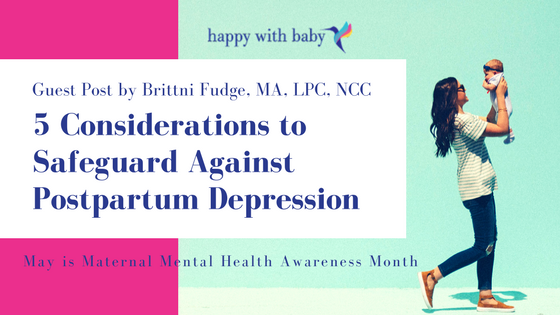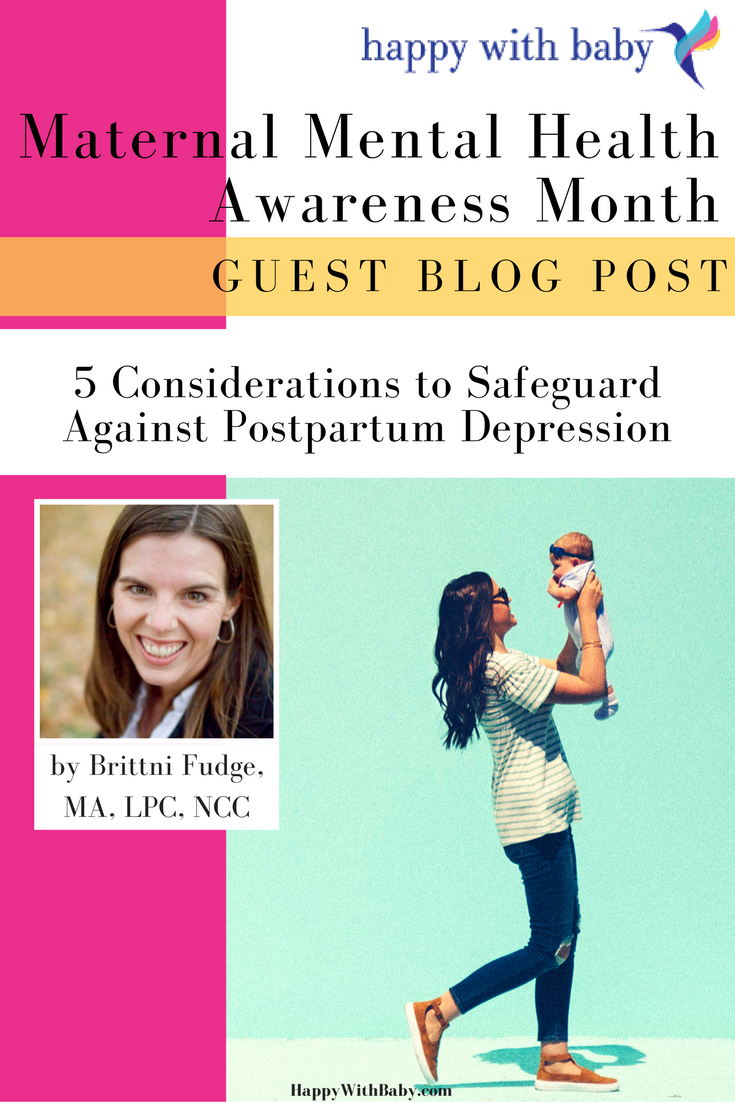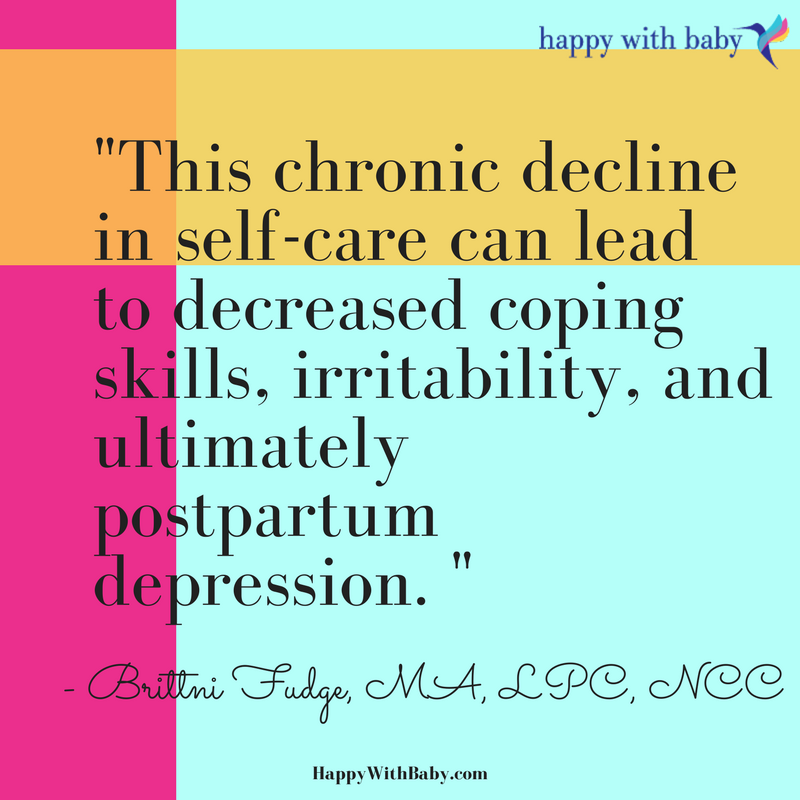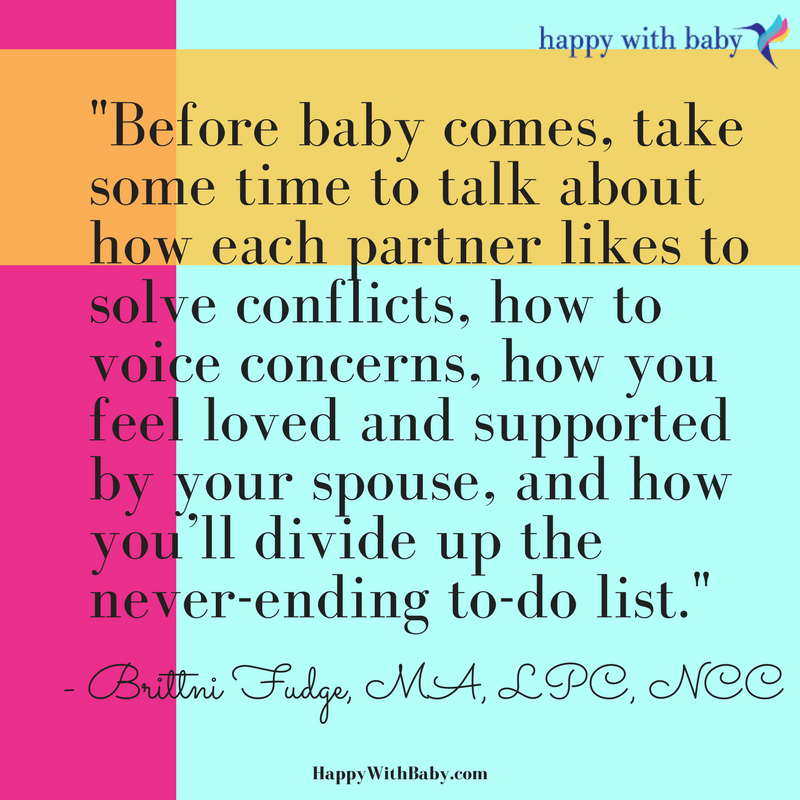Guest Blog: 5 Considerations to Safeguard Against Postpartum Depression

Written by Brittni Fudge, MA, LPC, NCC
Up to 20% of pregnant and new moms will experience some form of anxiety or mood disorder. This is a staggering number—especially considering these statistics are gathered based only on what women report. Due to the stigma around mental health, many women don’t report their depression or anxiety to healthcare professionals, so it’s likely that that number is higher.

Pregnant moms often ask me if there’s anything they can do to prevent postpartum depression.
While there are no magical steps that a mom can take to prevent postpartum depression, there are some protective factors that can reduce her risk of developing postpartum depression or anxiety: education, self-care, social support, safeguarding your relationship with your partner, and counseling.
Education
Learning the warning signs of postpartum depression and how it differs from the Baby Blues is important. If you and your partner know what’s normal and what’s a cause for concern, the couple is more likely to get help from a trained professional.
Self-Care

It’s time to abolish the martyr mom who is trying to do it all without help. The phrase ‘it takes a village to raise a child’ was once an accepted mantra of a time when the entire community was invested in raising the children—helping with supervision, feeding, teaching, meals, and letting the mom rest. In current times, many moms have adopted a ‘super-mom’ mantra that screams “I can do it all! With a smile on my face! I don’t need help!” This often leads to moms who are able to keep it all together on the surface, but are silently losing themselves in their mothering. Their every waking moment is focused on taking care of their baby (and often their partner, their neighbors, their jobs, and everything in between)—but not themselves. This chronic decline in self-care can lead to decreased coping skills, irritability, and ultimately postpartum depression. During the prenatal period, take some time to talk to your partner about how you can both prioritize and support the other’s self-care: how can you take care of yourselves in small ways throughout the day?
Social Support
The importance of social support in the postpartum period is important, but the added bonus of being able to ask for help can’t be understated. When a friend asks how they can help, let them help. Maybe they can hold the baby while you shower, help you with the dishes or run the vacuum cleaner. The important thing here is being comfortable with asking for help and accepting help.
Safeguarding your relationship with your partner

Going from a couple to a family of 3 can be one of the most joyous times in a couples lives. It can also add stress, irritability, and an increase in fighting as each partner feels the extra demands of raising a child. Before baby comes, take some time to talk about how each partner likes to solve conflicts, how to voice concerns, how you feel loved and supported by your spouse, and how you’ll divide up the never-ending to-do list (grocery shopping, meal prep, cleaning, paying bills, etc). Having a plan of how you’ll handle these issues can help you avoid conflict in the postpartum period.
Seek Counseling
Seeking counseling for mom can be an important factor in decreasing the likelihood of developing postpartum depression or anxiety. Becoming a mother can bring up past difficulties with her own mother, issues regarding her identity, and a shift in priorities…all of which can be supported by a therapist who specializes in supporting moms. Many therapists are offering education and support in helping couples prepare their relationship with baby. Look for support in your area in advance.
About Brittni Fudge, MA, LPC, NCC:

Brittni Fudge, MA, LPC, NCC owns Kindred Counseling, PLLC, in Denver, Colorado, where she provides counseling for moms in all stages of motherhood. Brittni’s first role is a mother of three children under age seven, and is also a mental health therapist, Love & Logic facilitator, parent coach, and former school counselor. Brittni is on a mission to support mothers in their mental health so they can be fully present with their littles. Learn more at www.kindred-counseling.com
CONNECT WITH BRITTNI:
Website: www.kindred-counseling.com
Facebook: www.facebook.com/kindredcounseling
Subscribe
Sign up to get the latest weekly blogs sent straight to your inbox


0 comments
Leave a comment
Please log in or register to post a comment